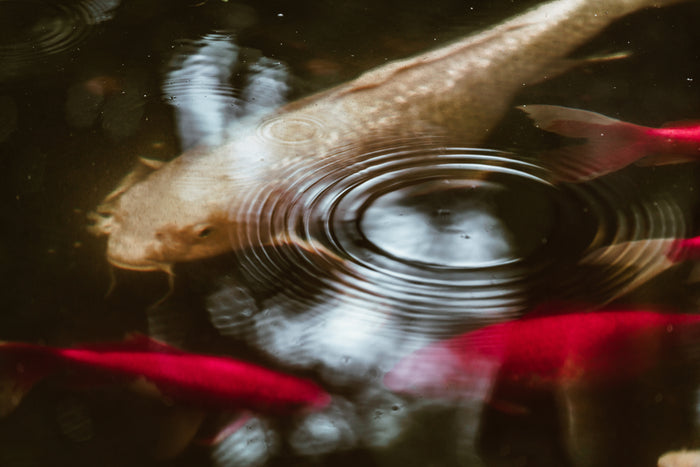As the weather cools and your garden pond starts to wind down for the year, your fish’s needs change too. One of the most important adjustments you can make during the colder months is switching to a wheatgerm-based fish food. But why is this so important, and what makes wheatgerm ideal for winter feeding?
1. Slower Digestion in Cold Water
When pond temperatures drop below around 10°C, your fish’s metabolism naturally slows down. They become less active, spend more time near the bottom of the pond, and their digestive systems can’t process rich, high-protein foods efficiently.
Wheatgerm is easily digestible, even in cooler water, making it much gentler on their systems. This helps prevent waste build-up and water quality problems that can occur when undigested food decays in the pond.
Try: Water World Wheatgerm Fish Food Pellets– formulated for koi, goldfish, and other coldwater pond fish.

2. Packed with Nutrients for Winter Health
Wheatgerm is rich in vitamin E and essential fatty acids, both of which support immune function and help your fish maintain good health through the colder months.
This is especially important as fish become less active and more susceptible to stress or infection during periods of fluctuating temperatures.
3. Helps Prepare Fish for Spring
Feeding wheatgerm in autumn and early spring helps your fish transition smoothly between seasons. It keeps their digestive system active and supports steady energy levels as water temperatures rise and fall.
Once the water consistently reaches above 10°C, you can start gradually switching back to a high-protein summer diet to encourage growth and colour development.
4. Feed Sparingly
During the winter months, feed small amounts only on milder days when your fish are active and come up for food. As soon as the temperature drops consistently below 5°C, stop feeding altogether until spring – your fish can safely fast during this time as their metabolism slows right down.
Keep Your Pond Fish Healthy This Winter
Switching to a quality wheatgerm food is a simple but essential part of winter pond care. It supports digestion, boosts immunity, and keeps your fish in peak condition ready for springtime.


